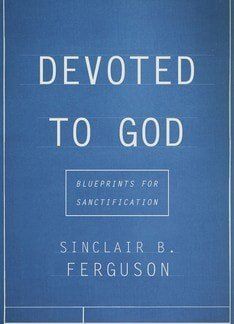In spring 1991, a gathering of pastors in Leicester were listening intently to a preacher expounding the doctrine of sanctification. Their hearts burned within them as in three sessions he gave a masterly overview of his subject and drove home his message with real conviction.
What particularly riveted their attention was the way that all the elements of biblical teaching were so clearly woven together. Some of those present wondered whether these messages might one day appear in printed form. That hope has been realised in this publication; Sinclair Ferguson has repackaged, expanded and adapted his material for a wider readership.
The title of the book is Dr Ferguson’s definition of sanctification. There are ten chapters, each of which is based on a pivotal portion of the New Testament. Together they deal with the following aspects: six foundational principles and motivations to holiness (1Peter 1); the renewing of our minds and consecration of our bodies (Romans 12:1-2); a new life and new identity (Galatians 2:20); being dead to sin in our union with Christ (Romans 6); the continuing battle in the power of the Spirit (Galatians 5:16-17); putting off old ways and adjusting to a new way of living (Colossians 3); our responsibility to kill sin, because we are being led by the Spirit (Romans 8:13); the role of God’s law in our sanctification (Matthew 5:17-20); the need to persevere, for without holiness no one will see the Lord (Hebrews 12:1-14); and Christ-likeness is the goal of sanctification (Romans 8:29).
There are four appendices on related issues. A further addendum prints the texts of the pivotal Scriptures in the NIV 1984 translation, which he uses throughout. Here we have careful exposition, true systematic theology and pastoral counsel helpfully served up, with illustrations and bullet-point summaries.
It is a stimulating read with the constant reminder that Christ himself is at work in the believer’s life. We are in Christ and Christ is in us; he is our sanctification. Ferguson reminds us that a failure to grasp this fullness of the Bible’s teaching on sanctification impairs a pastor’s ministry and adversely affects the life and testimony of our churches.
I was particularly helped by what was, for me, a new angle on the subject of baptism in relation to sanctification. Ferguson steers us away from the usual controversy and focuses on the most important aspect on which we can agree. Our baptism points us to our union with Christ and gives us a new identity in him. Our baptism renames us.
Also of significance is his insistence that the law is a necessary instrument in our sanctification. He counters the modern indifference to the commandments of God. Jesus fulfils the law in us by the Spirit, so the Spirit of Christ in us and the Word of God to us exist in total harmony. Though no longer married to the law, we are married to Christ, who embodies the law and so we become an ‘in-law to the law’.
Although it would have been helpful to have had some engagement with the latter section of Romans 7, I am sure this publication will come to be regarded as a classic. Taste some of the many quotable extracts: ‘[Christ’s] uniting himself to us in our human nature is the basis for our uniting ourselves to him in faith’ (p.57); ‘Our lives are transformed only when our minds are renewed’ (p.65); ‘Sanctification was never intended to be an individualistic project’ (p.109). ‘Grace leads us to mortify sin, not to tolerate it’ (p.202).
Roger March
Wolverton



